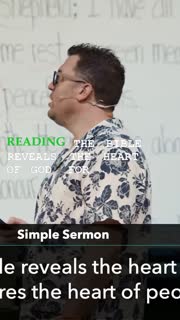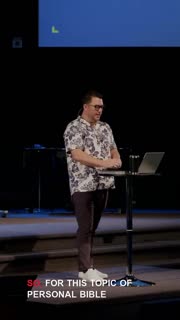Embracing Personal Bible Reading: Finding Your Unique Path
Devotional
Sermon Summary
Bible Study Guide
Sermon Clips
1. "Here's what I'm hearing. I'm hearing that pretty much everyone says this is beneficial. It's something I should do. Okay. One out of three of you are saying it's really hard and four out of five of you are saying I really should do it more, but I don't because it's hard. So what I would guess is that there is a lot of guilt in the room right now because this is something I feel I should do. It's beneficial and I'm not doing it enough. I'm not doing it enough because it's hard." [40:53] (26 seconds)
2. "In fact, Jesus Christ, the gospel came to free us from guilt, shame, and fear. So something wasn't adding up there. And so this is what I want to talk about. But let's get into it. If we can go back to the PowerPoint, thank you for participating. That's really helpful. I want us to read a few passages. And by us, I mean, I'll read them to you." [41:42] (18 seconds)
3. "When you turn being devoted to something into a verb, the noun into a verb, you call it devotions. There are spiritual disciplines or exercises that are good for us as Christians, devotions, or personal Bible reading, that is one of them. And it should be done out of a desire and out of love for God, not out of just strict duty. Now, does that mean we always feel like doing it? No, no, no. And so you, there is an element of commitment, but generally speaking, devotions should involve an element of desire and love." [44:56] (35 seconds)
4. "If the God you love... If the God you are uncovering in your Bible reading has you like terrified and you don't like him, you're not reading the Bible right. So, make sure that you are knowing the right God and your Bible reading is leading to a knowledge that leads to love. And then the second thing, there's only two, is do you enjoy it? So, I would say if you're reading the Bible and you're getting to know God and you're enjoying it, you're not loathing it, you're not hating it, you're not avoiding it, you're probably doing something really close to good and right." [50:53] (31 seconds)
5. "When you read stories about like Jesus teaching in a very crowded house and somebody tears the roof apart and lowers somebody on a bed, we're just like, yeah, okay. But we don't grasp if right now, while we were in church, if the roof started to get torn apart wide enough so that someone who was paralyzed and can't move, so you're talking like at least three feet wide, at least six feet long, is lowered down in the middle of this service, you would have thoughts and emotions. You would be like, what is going on?" [01:00:30] (25 seconds)
6. "Reading the Bible reveals the heart of God for people and restores the heart of people to God. And I use the word restore because remember according to the Bible we were made in relationship with God and for relationship with God. That broke but God is on an eternal mission to restore that. And so you were made for relationship with God. There is a God-sized longing in your heart. In every human heart. Ecclesiastes which we looked at a while ago says there is eternity in the heart of man." [01:25:57] (30 seconds)
7. "Pursue God in a way that works for you. He made you. It wasn't a mistake. Let me give you a couple of suggested resources. I know this is long, but we're talking about the whole Bible. Come on, that's big. Give me some credit. Okay, some potential resources. And there's a whole lot more. Okay, if you have ever been on YouTube, you've probably seen the guys, The Bible Project. And they take, how they got started was they took a whole book of the Bible and in five to eight minutes, they explained what it was and they were drawing it and in the end, you would have a poster." [01:22:02] (32 seconds)
8. "So, for this topic of personal Bible reading, I want us to avoid things. I want to stick to things that accomplish knowing God. So, it should be God-centric. It should be... And avoid things that are helpful but not that. So, like character development. Important, but not the point of devotions. How to evangelize or how to this. Important, but not the point of devotions. That's something different, right? So, that is how I'm kind of limiting this time." [49:42] (28 seconds)
9. "So, I would say if you're reading the Bible and you're getting to know God and you're enjoying it, you're not loathing it, you're not hating it, you're not avoiding it, you're probably doing something really close to good and right. If you only have one of those, that's probably going to set you back. And if you don't have either, I think you need to consider changing something. Now, when you're picking an approach, something else you should really keep in mind is God made you and he didn't make a mistake." [50:53] (27 seconds)
10. "So, what should I take away from that? What I should take away from that probably is something more like, I can be brutally honest with my feelings with God. I can tell him what I'm really thinking and what I'm really feeling and let him take those feelings and shape them. What I probably shouldn't take away from that is that God wants to smash people's children's heads on rocks. That's not, even though it's in the Bible, that's not what it means, right?" [01:18:31] (20 seconds)
Ask a question about this sermon
2. "In fact, Jesus Christ, the gospel came to free us from guilt, shame, and fear. So something wasn't adding up there. And so this is what I want to talk about. But let's get into it. If we can go back to the PowerPoint, thank you for participating. That's really helpful. I want us to read a few passages. And by us, I mean, I'll read them to you." [41:42] (18 seconds)
3. "When you turn being devoted to something into a verb, the noun into a verb, you call it devotions. There are spiritual disciplines or exercises that are good for us as Christians, devotions, or personal Bible reading, that is one of them. And it should be done out of a desire and out of love for God, not out of just strict duty. Now, does that mean we always feel like doing it? No, no, no. And so you, there is an element of commitment, but generally speaking, devotions should involve an element of desire and love." [44:56] (35 seconds)
4. "If the God you love... If the God you are uncovering in your Bible reading has you like terrified and you don't like him, you're not reading the Bible right. So, make sure that you are knowing the right God and your Bible reading is leading to a knowledge that leads to love. And then the second thing, there's only two, is do you enjoy it? So, I would say if you're reading the Bible and you're getting to know God and you're enjoying it, you're not loathing it, you're not hating it, you're not avoiding it, you're probably doing something really close to good and right." [50:53] (31 seconds)
5. "When you read stories about like Jesus teaching in a very crowded house and somebody tears the roof apart and lowers somebody on a bed, we're just like, yeah, okay. But we don't grasp if right now, while we were in church, if the roof started to get torn apart wide enough so that someone who was paralyzed and can't move, so you're talking like at least three feet wide, at least six feet long, is lowered down in the middle of this service, you would have thoughts and emotions. You would be like, what is going on?" [01:00:30] (25 seconds)
6. "Reading the Bible reveals the heart of God for people and restores the heart of people to God. And I use the word restore because remember according to the Bible we were made in relationship with God and for relationship with God. That broke but God is on an eternal mission to restore that. And so you were made for relationship with God. There is a God-sized longing in your heart. In every human heart. Ecclesiastes which we looked at a while ago says there is eternity in the heart of man." [01:25:57] (30 seconds)
7. "Pursue God in a way that works for you. He made you. It wasn't a mistake. Let me give you a couple of suggested resources. I know this is long, but we're talking about the whole Bible. Come on, that's big. Give me some credit. Okay, some potential resources. And there's a whole lot more. Okay, if you have ever been on YouTube, you've probably seen the guys, The Bible Project. And they take, how they got started was they took a whole book of the Bible and in five to eight minutes, they explained what it was and they were drawing it and in the end, you would have a poster." [01:22:02] (32 seconds)
8. "So, for this topic of personal Bible reading, I want us to avoid things. I want to stick to things that accomplish knowing God. So, it should be God-centric. It should be... And avoid things that are helpful but not that. So, like character development. Important, but not the point of devotions. How to evangelize or how to this. Important, but not the point of devotions. That's something different, right? So, that is how I'm kind of limiting this time." [49:42] (28 seconds)
9. "So, I would say if you're reading the Bible and you're getting to know God and you're enjoying it, you're not loathing it, you're not hating it, you're not avoiding it, you're probably doing something really close to good and right. If you only have one of those, that's probably going to set you back. And if you don't have either, I think you need to consider changing something. Now, when you're picking an approach, something else you should really keep in mind is God made you and he didn't make a mistake." [50:53] (27 seconds)
10. "So, what should I take away from that? What I should take away from that probably is something more like, I can be brutally honest with my feelings with God. I can tell him what I'm really thinking and what I'm really feeling and let him take those feelings and shape them. What I probably shouldn't take away from that is that God wants to smash people's children's heads on rocks. That's not, even though it's in the Bible, that's not what it means, right?" [01:18:31] (20 seconds)










